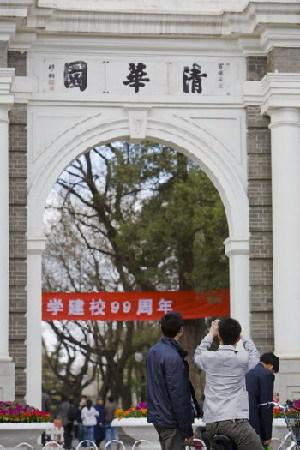
Students at Tsinghua University campus. Many government officials from Africa now study at postgraduate level at the educational establishment's School of Public Policy and Management under the sponsorship of China's Ministry of Commerce. [Wang Heng / China Foto Press]
Universities provide centers of excellence for continent's businessmenBEIJING - One man's meat is another man's poison. While there are those quick to criticize China's venture in to Africa for strong presence, Edward Kadozi views it as a golden opportunity for his country to benefit from the various facets of China's development successes.
"In Africa, we talk about bringing the Asian dragons or tigers to the continent," says the program specialist from Rwanda's Ministry of Foreign Affairs and Cooperation.
"We want to learn how China could manage a population of 1.3 billion and at the same time develop at a fast rate."
He's one of the many African government officials sponsored by China's Ministry of Commerce to study at postgraduate level at Tsinghua University's School of Public Policy and Management.
Lecture in English
The school, just a decade old, has benefited from the intellectual exchange and diversity of backgrounds and experiences among its foreign officials and students. It boasts three public policy programs including an international program taught in English, an accomplishment considering a decade ago it was a rarity for universities in China to offer courses in English because of the language barrier.
It's a different story these days at the school. Half of its faculty members are fluent in English and are trained abroad, says Lan Xue, dean of the school.
The first such professional institution in China, the School of Public Policy and Management is gaining more ground in promoting understanding and building trust among its foreign students, who are mostly officials from developing countries where China has existing or potential interests - economic or otherwise.
Sponsored by the Ministry of Commerce, the one-year full time international Masters of Public Administration grants full scholarships to all enrolled foreign officials. Begun in 2008, the program is designed for mid-career officials recruited by the ministry's offices located worldwide. So far, the program has 35 graduates and another 36 are expected to graduate this summer.
"Having them here is enlightening for us and vice versa due to the lively and thought-provoking exchanges. Some of them are pro-US, pro-India, pro-West, pro-Asia and so forth. We would rather have the debates in the classrooms than in the battlefields," he says.Speaking about the school's role and mission, Lan - a frequent traveler and eloquent speaker who can comfortably take criticism about China - says: "It is our way of showing the nation that many people don't know. China is more open than most people think."
The school has proved that it has something valuable to offer. As a sign of recognition for its achievements and contribution to the next generation of leaders, the US-based MacArthur Foundation awarded a grant in 2009 to the school to launch a Masters of Development Practice program.
What's significant is that the school was chosen on a global competitive basis, its educational ideas and value to students, knowledge tools, and a unique experience in relation to developments in China.
When China rules
All these bode well for China and the Chinese. The education scholarships to foreign officials and international recognition translate into better relationships, a better image and better understanding.
This is especially critical to China because the country needs to build a good image abroad, says Lan. Monetary assistance aside, China has granted aid to Africa in the form of training for business skills development such as rice planting and managing textile shops.
While aid, in any form, is a public relations tool to create a positive image for a donating country, he says: "The West has overestimated China's aid to Africa. China has been consistent in its aid to Africa since 1956. Why is the West making a big fuss now?"
American academic Deborah Brautigam wrote in her book The Dragon's Gift that while China's aid to Africa is cloaked in ambiguity, the West should stop believing in myths and start engaging with the reality of a rapidly changing world order.
Calling on decades of personal experience as an observer of Africa and Asia, Brautigam writes about Angola, where China has helped build hospitals, schools, irrigation systems, roads and infrastructure.
Unlike Western donors, which tend to have their favored nations, China has given assistance to almost every country in sub-Saharan Africa. Chinese aid workers and experts in Guinea live in similar style to the locals, unlike Western aid donors, she writes.
China's image abroad is reflected by its lack of experience in international engagement. As China becomes more integrated into the global community and becomes more confident, its international image will continue to improve, says Anthony Saich, director of the Ash Center for Democratic Governance and Innovation at Harvard University.
Not resting on its laurels, the school is progressing to offer courses to enhance soft skills. "More recently, we have come to realize that training in management and public administration are equally important," says Lan.
Saich adds that China can learn best practices from abroad and this will help it achieve modernity - but what is most important is that the country finds its own path to modernity.
"It can learn from outside but those lessons have to fit well with China's own culture, history and institutions," he said.





